|
|
|
 |

Insurecom.com
petsmart.com
|
|
|
|
| |
|
|
 |
|
|
|
| |
|
|
Dr. Charles Silverstein, our Travel Editor, is a licensed psychologist in New York City. He is best known for having presented the case for the deletion of homosexuality as a mental disorder before the American Psychiatric Association. He is also the founding director of two gay counseling centers, and the founding editor of the Journal of Homosexuality.
He's author or co-author of six books about gay life, including the three editions of the popular Joy of Gay Sex, contributed chapters and articles in professional books and journals. He is considered an expert in the diagnosis and treatment of relationships between men and problems of sexual disorders. Further information about him and his practice may be found on his website:
|
www.doctorsilverstein.com
|
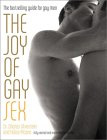
|
 |
| |
|
|
GAY TRAVELS |
|
by Dr. Charles Silverstein |
|
Vietnam Journal (Part 1 of 2)
|
|
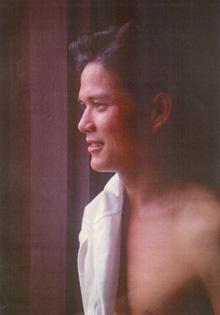 |
|
Our Guide "Dat" in Hanoi
(taken in the Fine Arts Museum) |
|
"Come and stay with me in Hanoi," said an old friend of mine, Tom who represented a large American corporation. He was given ahouse as one of the perks of his job that took him 14,000 miles from his home in Chelsea, New York's gay Mecca. Another was an never-ending series of Vietnamese boyfriends that would exhaust a man of lesser energy. Earlier he had asked me to mail a package of products hard to come by in Vietnam: cold medicines, other over the counter pills, and condoms. The package arrived just as he was going to a meeting, and while sitting in the board room, he opened the package and spilled its contents on the table. The 300 condoms tumbled into a neat mound in front of him. "Your reputation in Vietnam is secure," said his boss, while a couple of other gay men in the room looked at the pile with envy. Later in the day Tom gave each of them a handful.
Vietnam isn't exactly around the corner from New York City. It was six hours to Vancouver and a 90-minute stop for refueling, then 14 hours to Hong-Kong. Then we had an eight-hour layover until the plane to Hanoi, a two-hour trip. That's 32 hours. (Incidentally, the time different is 12 hours between New York and Hanoi.) Tom met us at the airport, and commiserated with me when I learned that a duffel bag was missing. "What's in the bag," said the extremely polite Vietnam Airlines official in charge of missing baggage. "Bubble wrap," I answered. I travel everywhere with bubble wrap, because
|
(This article was first published in both The Guide and Mandate Magazine in 1997. It is a description of my two-week trip to Vietnam, accompanied by my friend and colleague, Judy Clarke. Judy had been given a stack of money for her birthday in order to spend a vacation anywhere she wished. She used it to join me in South East Asia. I've divided the article in two parts because it's so long. This way you can read it in two readings if you choose to do so. I've left out the names of most of the gay bars in Hanoi and Ho Chi Minh City because they are not there anymore. You'll have to search the Internet for up-to-date information about gay venues.)
|
|
|
|
|
it's perfect for transporting breakable objects I buy for friends and myself. The official looked at me quizzically, and I realized that he'd never understand what I was talking about. "Here, write it down," he said.
That was Saturday afternoon. He explained that if I left my passport, the bag would clear customs after it arrived, and that they would deliver it to Tom's house. Here's your first lesson about Vietnam. Don't give up your passport unless you must absolutely do so. Make copies of it (your visa too) and use that. He refused a copy and I refused to give him the original. "You'll have to come back on Monday, then," he said. "Why not Sunday," I asked, but the office is closed on Sunday. This is the result of the monopoly of Vietnam Airlines, the only airline allowed to fly into and out of Vietnam, and therefore, without competition. No matter what airline your flight coupon states your flying, you'll fly in and out on Vietnam Airlines. We left knowing that I'd have to return in two days. I could live that long without my bubble wrap.
Tom's house was two stories high, the entrance guarded by a large wall, with a gate kept locked at all times. Only a few years ago his district was a swamp. Now it was filled with small businesses and homes. Oddly, they all seemed so decrepit, the paint already peeling, plaster and cement falling off, that one could easily imagine that they had designed a slum. More homes were going up everywhere, and you could see that they hadn't quite gotten the knack of construction.
And so began my two week adventure to Vietnam.
It is still a communist country, ruled by an authoritarian regime that owns almost everything. There is no gay liberation movement here, or any other liberation movement, for that matter, but I knew that gay life existed here as it does virtually everywhere, if only one knows where to look. And after all, Tom and all his other gay ex patriot and diplomatic friends had Vietnamese lovers.
Homosexual behavior is not illegal in Vietnam, and gays are not harassed by the police. There are gay bars and dance clubs in both Hanoi and Ho Chi Minh City and while they are "mixed" most nights, almost all the discos have "boys night" one night a week. Even during the "mixed" nights, gay men will dance together but so will straight men, so that one can't assume that two men dancing together are gay even if they touch each other in a way that American straight men would never do.
----------------------------------------------------------------
| |
a d v e r t i s i n g

|
|
---------------------------------------------------------------
Unfortunately, Vietnamese are not allowed to get onto the world wide web, presumably because that might expose them to ideas the government prohibits, like democracy. You can e-mail to Vietnam, but expect it to take anywhere from five to seven days to arrive. It must first be read by an official "cybersnoop" so that the government has absolute control over all information that goes into and out of the country.
While the police do not harass homosexuals, they frown upon transvestites. There were a couple of gay bars in Ho Chi Minh City that had drag shows, and these were closed down by the police. Otherwise they appear to view homosexuality with curiosity. Ironically, the police do not stop the institution called "Lady Man." It happens this way. You're walking on the sidewalk in Ho Chi Minh City one night, when suddenly a motorcycle comes right onto the sidewalk blocking your path. On it is either one or two transvestite prostitutes, decked out to the nines, and looking at you coquettishly. They are unconcerned with your sexual orientation. Only a lunatic would go with them since more often than not, a customer ends up robbed, often drugged. Beware. Remember, you're a homosexual - you like men, not women!
Tired though Judy and I were from the long flight to Hanoi, I accompanied Tom to a reception at the compound of a Western European embassy. Much of the English speaking diplomatic service was there mixing freely with the ex pat businessmen. It was there that I learned how small, friendly (and gossipy) the ex pat community was, people that I would meet for the next five days in a few good restaurants in the city. It would be virtually impossible to go to supper without bumping into them, stop and chat, gossip about this ambassador or that, or about the sexual peccadilloes of the Charge d'Affaire of one country or another. It was very clear who was gay and who straight at the party, but no one seemed to care. Perhaps they appreciated the information, making potential dating less fraught with disappointment. It was there that I met "Natasha," a Russian ex pat who owned an art gallery in Hanoi's old city. It was she that told us about a noted Hanoi Revolutionary Period artist by the name of Van Giao, and drew a map that would lead to his house. He recently held an exhibit in Toronto - "100 pictures of Ho Chi Minh." I was determined to buy one of his paintings.
We left the embassy party at 11:30 p.m. We were a group of four, Tom, Bentley (an Australian diplomat) his Vietnamese lover Linh and me. We were off to the only certifiably gay café in the city. Well, "café" is somewhat an exaggeration. Lieu's Café, wasn't large enough to hold an intimate dinner party. Everyone sat outside on chairs so small that it gave me the impression that they had been stolen from a kindergarten class. I was to find them everywhere in Vietnam. There probably weren't more than six people sitting when we arrived, only one of whom spoke English -- well, sort of. They were all gay. Then a German diplomat arrived, his Vietnamese (and cute) lover in tow. Of course they wanted to meet the new Westerner, me, but they all had trouble pronouncing "Charles," so they dubbed me "Charlie," the name given to the Viet Cong by American soldiers during the war. I asked Tom if he thought they would identify themselves as gay, and he thought not. "They'll all go on to marry a woman," he said. I'm not so sure. Tom was spying a beautiful young man in shorts. So was the German, whose hand slipped occasionally onto the boy's knee. "Just a tease," I said to Tom.
On to the Hanoi Roxy. It's the mixed disco in Hanoi, at 36th Street in the center of the old city. There's no admission charge. As best I could determine, there is no minimum age for drinking in Vietnam, and some of those sipping beers at the Roxy were obviously teenagers. I never saw anyone drunk in the country, probably because they don't have enough money to get drunk. "Mixed" was hardly the word for it. Gay, straight, teeni-boppers, thirty-something, all the way up to senior citizens danced together on the stage of a building that had formerly been a movie theater. The music was at least 20 years behind us, the bass under-powered (thankfully), and the volume hundreds of decibels lower than an American dance club, making conversation possible. The heat in this non-air conditioned club was so oppressive that one could have cut it with a knife. It reminded me of dancing in "The Firehouse," during the heyday of New York's "Gay Activist Alliance" in the 1970s. There were rounds of introductions to ex pat business men and members of the diplomatic corp. I loved it but I was starting to feel a wall of fatigue falling over me since I had just arrived that day, wasn't sure of what day or time it was. We left after an hour, and though tired, I was filled with excitement anticipating my first full day in Hanoi.
We took a taxi home. At one point during the ride we passed a small group of young women siting on the sidewalk sipping soup. When they waved at me, I smiled and waved back, still on a high from the night's excitement. The taxi driver exploded into laughter. They were prostitutes looking for business! Well, what can you expect from a newly arrived Rice Queen?
There's one more popular mixed bar in Hanoi. It was called the "Gold Cock," but the police ordered them to change the name, so they renamed it the "G/C ". It's a quiet place, like walking into a soft, darkly lit lounge. Virtually everyone who's gay gets there sometime during the week, and the night Tom and I arrived a number of friends, gay and straight, walked over and chatted with us. A few obviously gay Vietnamese were sitting by the bar furtively glancing at the two Americans, but we didn't return the glances, since we had already been joined by a half-dozen friends.
Tom secured the services of "Dat," a 26 year old Vietnamese man as our guide in Hanoi. Dat spent the next five days, from 9 am to 10 pm, traveling, translating, and helping to smooth my way around the city. He looked 18, not 26, but then all the Vietnamese are short, extremely thin, look like they could wear each other's clothes, with demure manners, beautiful skin, and looked many years younger. He was shy in my company his head bent slightly down, and his English spoken so softly that one couldn't tell if it was the natural volume of his voice or the insecurity of speaking a foreign language. (Incidentally, when someone tells you his age, deduct one year. The day of birth is considered one year, so that Dat, who said he was 26, was actually only 25 by our method of counting.)
One doesn't get into conversations about sex casually in Vietnam as we do here in the United States. There's no "guy talk" or sexual innuendoes such as someone's endowment or sexual fantasies. It's a very conservative place, Western style cruising simply too public, too aggressive for a Communist country in which Buddhism is still the dominant religion, followed by Catholicism. Not talking about sex, publicly or privately, obviously interferes with AIDS education and I doubt that many gay Vietnamese have even a rudimentary knowledge of the HIV and its transmission. The local newspapers are government run, extraordinarily boring because of it and their contents propaganda for the successes of the government. In one of these papers, I read that of the first week in May, 1997, there were 5,481 HIV positive people in Vietnam, only 38 in Hanoi, but 1,937 cases in Ho Chi Minh City. It's hard to know how many of these cases were transmitted by gay sex and how many from IV drug use. The drug problem is very severe in the country. Diplomats I met were guessing whether the three police officials recently caught importing drugs, would be given the death penalty or not. They unanimously agreed they would die.
Sunday morning we started our tour of central Hanoi. "How do you want to go?" Tom asked. "By cyclo, of course," I said. A cyclo (pronounced see-klo) is like the old fashioned ricksaws of China, but with the carriage in front and a man peddling a bicycle in back. They are everywhere, at every time of day or night, in great abundance, and zero in immediately on Westerners. They are often quite annoying and on more than one occasion I almost caused a traffic jam while walking in the street with 6 to 8 cyclo drivers following me, each calling out for me to get into his cyclo. But they can also be fun to ride.
Tom, who speaks Vietnamese, began the negotiation. He was magnificent at it in a way that few Americans, unnerved by the process of bargaining, can be. "Eei!," he cried, turning his head away and mock-wincing in pain as the three cyclo drivers said how much money they wanted in order to ride us from his house to Hoan Kiem Lake next to the old city. (It’s two people to a cyclo.) "It's insulting not to bargain with them," he whispered to me and continued the negotiation which consisted of a number of counteroffers separated with periods of silence and the look of heavy thought. After about five minutes of this drama, Tom said, "They'll take us for 10,000 Dong a cyclo." One American dollar equals 11,600 Dong. The 30-minute ride was going to cost $2.58 for the three cyclos. The cyclo drivers were thrilled since they were still making many times more than they would had they ridden local Vietnamese.
|
 |
|
|
|
A cyclo ride is quite a trip. There are virtually no traffic lights anywhere, though in those few places where they exist, people respect them religiously. The streets are packed with bicycles, motorcycles, taxi cabs and cars, all going in whatever direction they chose, weaving in and out from one another, giving an impression of sheer chaos and impending disaster. Everyone is beeping his/her horn -- everyone and constantly, and even in those rare occasions when there isn't anyone blocking the way. The din of the "beep, beep, beep," is the music of the streets, a cacophony of sounds that could easily put a Westerner into auditory overload. Intersections were a special problem and weaving in and out, turning in one direction, then the other, to avoid this taxi, that cyclo, the family of four on a motorcycle, must have looked like the gait of a drunken man. There was nothing to do but to have faith in the experience of the cyclo drivers to get us across safely since their lives were in just as much jeopardy as ours. And they always did, partly because everyone drives slowly. There's none of the passion to speed as we have in the West. It's too hot to rush.
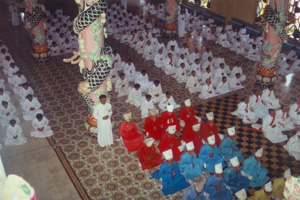 |
|
|
|
There are other means of transportation. Their taxis are new, clean and air conditioned. The driver always throws the meter and a cab ride in Hanoi or Ho Chi Minh City costs about a buck or so. There's also the "Say Om," which means "Embracing Taxi." Anyone with a motorcycle can offer a ride. You sit behind the driver with your arms around his waist, hence embracing him. It can be a charming ride and if he speaks a little English, you'll be peppered with questions about where you come from and what your country is like. More than one person I know found a horny say om driver, even a gay one, and ended up driving to a sexual liaison.
I never tired of the streets and the mass of humanity passing in all directions simultaneously. "Hello," someone would yell from the back of a bicycle or a motorcycle. It might be a child waving to me, or one of a few young women all holding onto each other's handle bars so that they can bicycle in a straight line together, or a whole family of four or five, the children tucked in between mother and father. People look at the exotic Westerner walking their streets, sometimes stare, mostly yell out "hello," and smile as they rush by.
We finally arrived at Hoan Kiem Lake. The lake is one of the centers of life in modern Hanoi, blessed with a cooling breeze and surrounded on all sides by "antique" shops, art galleries and restaurants. It is also one of the prime cruising spots at night. During the day tourists meet small groups of children selling post cards and books about Vietnam, all of them capable of at least rudimentary English and immensely curious about where you come from. If you buy post cards from these kids, don't pay more than half the stated price, and like Tom, take your time. These kids are ubiquitous throughout the country, sometimes charming, sometimes a pain in the ass. At night gay men cruise the walkway around the lake, but straight men also enjoy an evening stroll, so a Westerner has some difficulty identifying one from the other. There's also a temple on an island in the lake that one can enter.
The famous Vietnamese water puppets are nearby the lake. They are one of the most charming sights in the whole of Vietnam, and not to be missed. The puppets are made of wood and brightly painted. They are attached to long metal poles that glide underneath a shallow pool, and out of sight. The puppeteers stand behind a curtain that hides them from the audience, and maneuver the puppets through the water illustrating the story being presented. Alongside and above the pool of water is a small Vietnamese band that plays the background music. There is nothing like this in the West, and the show appeals to both children and adults. The best word to describe it is “Magical.” It cost 40,000 Dong, less than $4.
If you love old, narrow streets, lined with small stores, their items for sale cascading onto the sidewalk, the din of motorcycles, the noise of people shopping, the old city will mesmerize you. Most of the streets specialize in one product or another, a street for things made out of paper, or embroidery, or flowers. Guide books contain maps of the old city identifying these streets. I went straight for the silk merchants since silk can be bought at a fraction of its cost in the United States. I had already taken the measurements of friends, since one can buy the silk, and have it tailored in record time to take home.
It was beastly hot and humid, and it would remain so throughout our two week trip. (The nights, on the other hand, are delightful.) "Soda chang," I said in the hole in the wall restaurant in which the Judy, Dat and I stopped to relieve the heat. "Soda" means club soda, "chang" is lemon. Forget diet sodas. They won't even know what you're talking about. Do not drink lemon or orange juice unless it's out of a bottle or can that you open. Otherwise it's made with tap water - and you do not want to drink tap water in Vietnam.
I bought a Vietnamese conical hat for my head to protect me from the blazing sun. Locals couldn't stop laughing at it and it took me awhile to notice that only women wore conical hats in Hanoi. "The Hell with it," I thought. So they'll think I'm either a stupid foreigner or a fag. (I wouldn't want them to think I was a stupid foreigner.)
There are the usual sightseeing itineraries in Hanoi. One must go to the Ho Chi Minh Mausoleum. You'll march in single line, a Vietnamese soldier in front and back as you pass the body of Ho Chi Minh smiling peacefully from his huge coffin, his hands folded neatly across his stomach. Each year the body is sent to Russia for a change of the anti-freeze that's pumped into it to keep it from decomposing. I expect that a make-up artist spends quite a bit of time putting the rose on his cheeks. It is otherwise a bore. Not quite as much a bore as the Ho Chi Minh Museum which is dedicated to pure propaganda. But at least it's air conditioned, and you won't find that in any of the city's other museums. The Army Museum is pleasant and its propaganda value in the two rooms dedicated to the mothers of war dead. The Museum of Fine Arts is housed in a grand old French Colonial building and they have an excellent store of contemporary Vietnamese paintings for sale.
Vietnam is moving toward a market economy. They even talk about starting a stock exchange soon, a dizzying idea for a country in which people can't buy stock - but then there's nothing to buy stock in since the government owns virtually everything. They're touting a new idea in which the government sells 25% of the stock of, say, a hotel, to the employees of the hotel, 25% to other Vietnamese investors, while the government holds onto 50%. Of course they can't find any takers, the idea ludicrous since the government would still control everything. A joke making the rounds was this: "How can you make a million dollars in Vietnam?" The answer is, "Invest 100 million dollars."
The site covers many square miles, with long flights of stairs (one is over a thousand steps), and mountain trails. The scenery from the tops of these mountains is simply breathtaking. You need at least two days to see the place because it's spread out over miles of terrain. It's beautiful, but tiring. A two day pass costs 25 JD ($35) in 1994. Don't take the horses because they are only allowed to walk a very short distance. You do not need a guide, though there are lots of attractive ones. They don't know any more, and sometimes know a lot less, than guide books available at the hotels. But guides are useful if you want to do one of the more hair-raising, knee scraping, narrow ledge ascents. In general, however, you can't get lost; just follow any crowd up or down a mountain. The walk begins by passing through a narrow gorge called the "Siq," that empties into a courtyard containing the first of many building, called the "treasury." There's nothing in them, and the names are made up. We know almost nothing about their use.
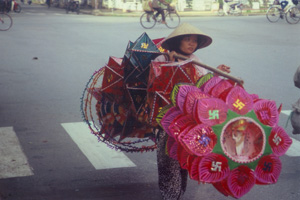 |
|
|
|
Where to cruise in Hanoi? There are many places beside the bars, disco and Hoan Kiem Lake (from dusk on) already mentioned. You can cruise AYOR in Lenin Park, but be careful. The park is actually closed at night and there have been muggings. Thien Quang Lake is very cruisy at night. Vietnamese and foreigners also cruise Ba Dinh Square, in front of the Ho Chi Minh Mausoleum. Indira Gandhi Park (Vietnamese name "Chi Lin Park") is near Hoan Kiem Lake, around Dinh Tien Hoang, is the place to find transvestites, if that's your thing.
Be cautious making contact with Vietnamese in the parks. Hustlers hang out there as well as rough trade who may end up with your wallet. There have been reports to the American Embassy of a few Americans tourists being drugged after taking a Vietnamese to a bar. But I wouldn't want to give the impression that the Vietnamese are generally dangerous. It's just that one should use good judgment and common sense when trying to make sexual contact in a third world country. The greatest problem you may have cruising is the fact that as a Westerner, people are looking at you and wanting to meet and talk to you all the time. A look that in the United States would be accurately interpreted as cruising, might only be the prelude to a Vietnamese sensing the opportunity to practice his English. Stick to the popular bars, discos and Hoan Kiem Lake.
Time to shop. The next day we hired three cyclo drivers and searched for Van Giao, the famous Vietnamese revolutionary artist that Natasha told us about. I felt like Sherlock Holmes sniffing out every clue. We stopped at a number of homes, until we learned that he had died the year before, and that his son was now selling his paintings. The cyclo drivers earned a tip when, finally stopping at a non-descript house and walking up two flights of stairs, we entered the small apartment of his son and the artist's elderly wife. Van Giao painted watercolors for over 60 years and died at the age of 80. A bunch of paintings were placed on the bed and the choice was obvious.
"If you don't buy it," said Tom. "I will." He was talking about a magnificent watercolor of four Viet Cong soldiers, painted in 1961. They were reading mail from home, explained Van Duk, the son. Three of the soldiers were huddled together, arms around each others shoulders, the hand of one soldier on the knee of the one sitting to his left. It was wonderful and I snapped it up.
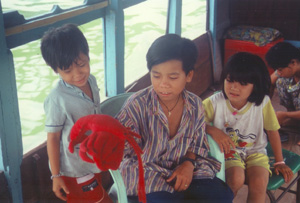 |
|
| Charles on top of one of the mountains in Petra |
|
In the afternoon we shopped for silk. Khai, the owner of a few silk stores in Hanoi has the largest and best selection of silk anywhere in the country. But the man is a pig! An obvious queen (he made a pass at Dat), he treats his employees, all young women, with contempt, and he'll overcharge you if you don't watch out. He tried to overcharge me, but I caught it. Then, for my drapes, he sold me a fine grade of white, embossed silk, with a solid green silk for the liner. When I received the fabrics, I found that the white silk was 115 cm wide, but the green liner only 90 cm wide. He knew about this discrepancy, but didn't care. He finally returned the money for the liner. If you buy silk in Vietnam, be sure you know its width.
"Khai is a pissy queen," I wrote into Dat's notebook of English expressions. He has English lessons at 5:30 a.m., three times a week with the gay Australian diplomat. "Tell Bentley to explain it to you," I said. "I know, I know," Dat responded, giggling under his breath.
"Dat is straight," Tom told me. "He'll get married and settle down like all the Vietnamese men." But during our days together, Dat said that he "didn't have time to date women." It wasn't a very convincing story. He was very attractive, with a quiet charm about him, and he seemed comfortable surrounded by so many gay diplomats, ex pats, and the stream of gay Vietnamese men that populated Tom's bed. We obviously became closer during our days together and I often took pictures of him. On one occasion, while we were alone in the Fine Arts Museum, I asked him to take off his shirt. He stood frozen for a few seconds, then pulled it off. He was a natural model, as so many of the Vietnamese are. Though conservative, they are uninhibited physically and strike relaxed poses, even while looking at the camera. Shy, but I judged a bit turned on by being the center of my attention.
That evening, our last in Hanoi, Judy and I went to the Water Puppet Theater, next to Hoan Kiem Lake. When we arrived home, Tom was about to get a massage. "The masseur comes at 9," he said, "and I come at about 11!" The masseur apparently knows how to please a Westerner. Dat decided to putter around the kitchen, and I went to bed anticipating dreams about my new painting surrounded by the classy new silk drapes. The next day Judy and I flew to Danang, on our way to Ho Chi Minh City.
... GO TO for Part 2 ...
Want to ask a question about Gay travel or submit your own travel stories? Email your questions or submissions to Dr.Silverstein at: psychs@mindspring.com.
|
|
photos by Dr. Charles Silverstein
|
|
|
 |
| |
|
|
|
|
|
|

